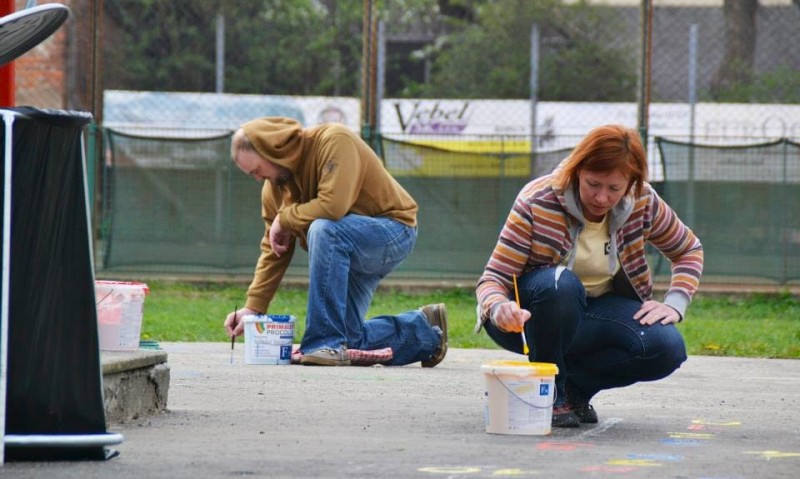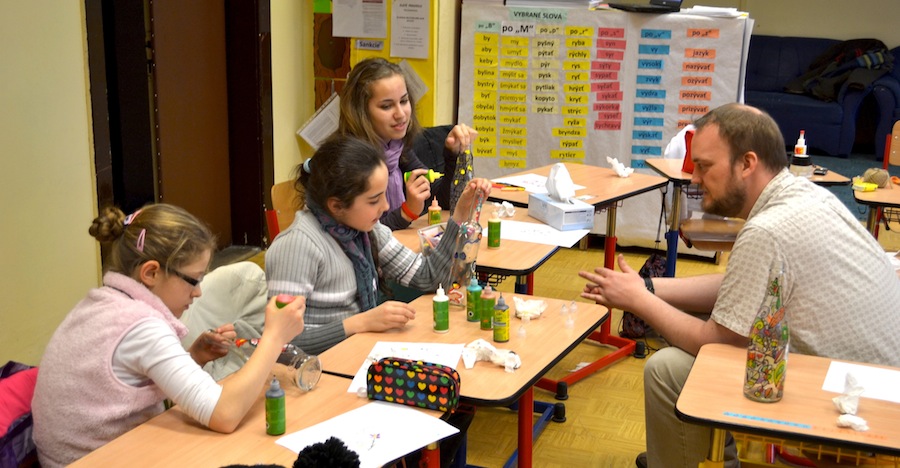An Interview with American Teacher Benjamin Chandler
American Benjamin Chandler teaches at the Lutheran Academy in Martin. In this third installment of an interview, Benjamin discusses his decision to leave his teaching job at a Lutheran school in the Chicago suburbs, move to Martin, and begin a new chapter in life.
When you decided to leave the United States and move to Slovakia, what did you leave behind?
Obviously the roles I had filled at Grace Lutheran, my old school, where I was the kindergarten teacher and the art teacher. My intention when I left was that I would someday come back, but that hasn’t happened. Maybe it will someday. Maybe not. I am always looking for what doors God is opening for me, trying to see where the Spirit wants me to serve.
I also was slightly involved in the art scene in Chicago. I was a very, very minor player, but I liked to make new work for shows, draw comics about starlings, and write fiction. I can still do all those things here (though sometimes I miss the figure drawing sessions I used to attend on Wednesday nights) but there is no English-speaking creative community in Martin. My creative output has to find a home either on the internet or the walls of my apartment.
I also was a son, a brother, an uncle, and a friend to many people in the U.S., but I hope that being on the other side of the world hasn’t ended those roles for me.
From your book I see that, besides being a teacher and an artist, you are also a student (and a fan) of long Slovak words. I appreciate your efforts to learn words like the 26-letter najneobhospodarovateľnejši, for example! In your book you remark that English doesn’t have such long words. Have you discovered any keys or helps in your quest to learn Slovak? (Your advice may actually help Slovaks, too!)
Slovak is definitely a challenge. In order to build a proper sentence, there are a lot of rules to digest right away. You can’t just build a sentence using English language rules and assume it’s going to work with Slovak words.
I am slowly learning. Many people tell me my Slovak is better than I think, but It’a and my students correct me frequently, so I know I’m not there, yet. However, I don’t embarrass myself at the grocery store anymore. I have memorized a few phrases that I know are grammatically correct, so I try to use them as much as I can.
Sometimes my language skills fail me, though, and I have to be creative, which can have frustrating or amusing results. When I was in the hospital [page 161] I could not remember the word for “blood” when talking with a nurse. I tried to use other words I knew and kept talking about my “red heart water,” but the nurse didn’t understand.
When learning Slovak, I think the key is to not be afraid to make mistakes. No one learns a language without making mistakes—even little babies make mistakes when they learn to talk. Also, be ready for lots of consonants jammed up next to each other.

What do you like most about teaching English as a Foreign Language (EFL)? Does teaching English in Slovakia present any special challenges?
I think teaching in the curriculum we use at the Academy has a few sides to it.
On the one hand, there’s the challenge of building a lesson that is exciting and interesting. Oftentimes I have had to teach things that I haven’t taught before. I never had to teach about Galileo and gravity in kindergarten! So when I get a new topic to teach, I often dive into the subject matter myself, trying to pick out what’s important, what’s interesting, what sparks my imagination, then start to build the lesson.
However, the second side to teaching EFL is taking that lesson and stripping away any of the linguistic stuff that might be a stumbling block for someone whose English isn’t very strong: jargon, technical terms, and other specific and esoteric vocabulary that would be meaningless to introduce. Sometimes, too, I want to tell jokes, but I realize that most of my students just don’t have the language skills to catch a pun or a play on words.
The third side to the lesson is making it interesting and exciting. It’s easy to just write an essay on Prometheus, or totem poles, or the history of the samurai, but that’s not always the best way to get kids to fall in love with learning. Sometimes I do write short essays for them to practice reading English, or to glean information, but more often I try to get them engaged beyond words on paper, and work to get the children to talk, perform, write, or draw—to give them avenues that will lead to them using English in some way.
When I can see a child’s eyes light up with the excitement of discovery or a sparked imagination, that’s my favorite part of teaching.
But, like I said in the book, the kids always surprise me, either by completely understanding a difficult lesson or by spiraling off into a tangent from which the conversation may not return.

Have you experienced any doubts during your ministry here? What has helped you most in overcoming your worries and fears?
Homesickness can be strong and difficult to work with. It comes in waves as if it’s part of my routine, every 8 weeks or so. Paired with that are the questions, “Why am I here? Am I doing any good? Is this really where God needs me to be? Am I doing the best I can to serve Him and His people?”
Often when I feel this way, I have turned to people from back home. They have been very supportive of my ministry here, my parents especially. My family as a whole has been very understanding, though they are always ready to mention how much they miss me. The pastor at Grace, Bruce Modahl, has been very supportive of me, sending me words of encouragement when I needed them most.
| The Center for Christian Education is grateful for the ministry of individuals like Benjamin Chandler. Please consider sponsoring Benjamin or one of his Lutheran Academy colleagues! For details, contact our Director of Development, Sisa Schudichova. |




Thank you, Benjamin, for communicating with your heart in this article. At so many levels Larry and I understand the perspective you express. By the way, Benjamin, we are the ones who left the assortment of random spices and the “Got’cha” fly swatter in your first apartment!
Thank you. I’m glad what I wrote resonated with your experiences, too.